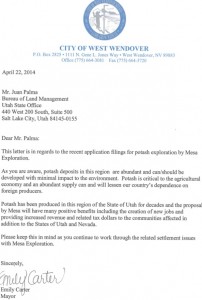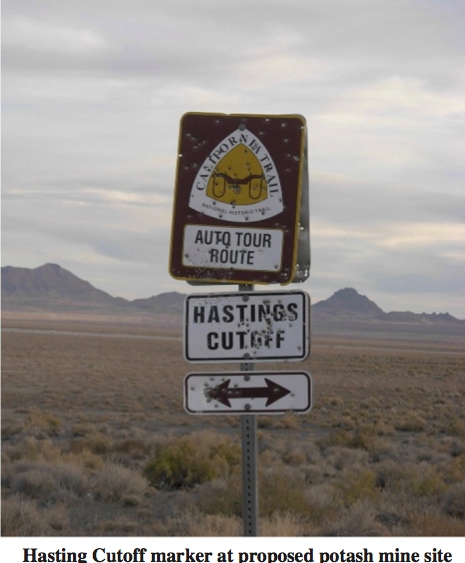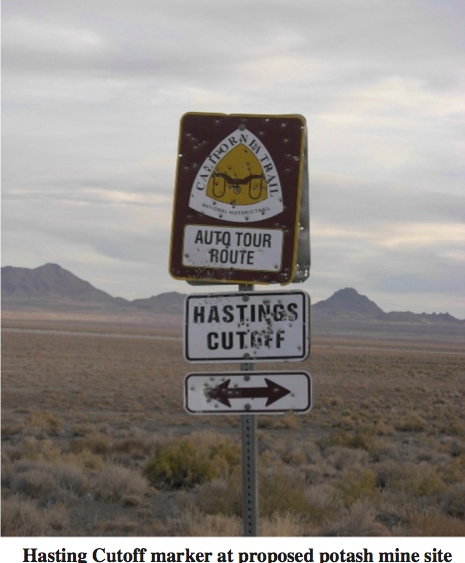Economic growth in Wendover took a major hit last week when the Bureau of Land Management rejected an appeal by Mesa mining for the company’s proposed potash mine 10 miles north of Nevada/Utah border town.
The BLM cited land management concerns stemming from the California Historic Trail, a 168 year old wagon trail that transects the project. The rejection prohibits any development for at least 10 miles on either side of the trail.
“This restriction imposed on this large area by the BLM is unprecedented, unwarranted and, we believe, unlawful. The BLM is tasked with finding multiple uses for the public land that they administer, the mandate being the best use of the land for the benefit of the most people;
This decision satisfies a narrowly focused special interest group.” said Foster Wilson, CEO of Mesa.
 The decision by the BLM was not unexpected.
The decision by the BLM was not unexpected.
Opposition to the project which would have created at least 40 very long term high paying jobs was spearheaded by the Oregon-California Trails Association which began a letter campaign against the proposed mine because of its proximity to the Hastings Cutoff, the “shortcut” taken by the infamous Donner Party as well as four other wagon trains in the mid 1800’s.
The Oregon-California Trails Association is the nation’s largest and most influential organization dedicated to the preservation and protection of overland emigrant trails and the emigrant experience.
“Mesa claims to have Utah Senators Orrin Hatch and Mike Lee, along with Congressman Rob Bishop, leaning on the Bureau of Land Management to authorize the project to “reduce dependence on foreign producers,” “provide economic development,” and jobs, jobs, jobs!” Wrote OCTA Utah member Will Bagley, on the Association’s website this June. “Genesis tells the ancient tale of how Esau sold his birthright to his brother Jacob for a bowl of lentil stew. For thousands of years, this “mess of pottage” has represented something worthless that is foolishly traded for an immensely more valuable birthright.
 For many of us, the playa at Pilot Peak is a national treasure, what the Park Service calls a place that is “fragile, sensitive, rare, irreplaceable, exemplary, unique, and vulnerable to adverse change.” The American past has an almost magical ability to disappear, but beneath the looming majesty of Pilot Peak, silent stretches of the Hastings Cutoff endure. The singular landscape of the Pilot Peak Playa should be a National Monument, not a strip mine.”
For many of us, the playa at Pilot Peak is a national treasure, what the Park Service calls a place that is “fragile, sensitive, rare, irreplaceable, exemplary, unique, and vulnerable to adverse change.” The American past has an almost magical ability to disappear, but beneath the looming majesty of Pilot Peak, silent stretches of the Hastings Cutoff endure. The singular landscape of the Pilot Peak Playa should be a National Monument, not a strip mine.”
Wilson was more than a little taken aback by the vehement and biblical opposition to his modest project.
![]() “I am all for preserving history,” said Foster Williams. “And I think this country has done a pretty good job. The main trail is marked over 2,000 miles across six states. Locally there is an Oregon Trail Interactive Center in Elko. But the Hastings cutoff was used by just four trains and is only note worthy because of the Donner Party.”
“I am all for preserving history,” said Foster Williams. “And I think this country has done a pretty good job. The main trail is marked over 2,000 miles across six states. Locally there is an Oregon Trail Interactive Center in Elko. But the Hastings cutoff was used by just four trains and is only note worthy because of the Donner Party.”
The Donner Party’s claim to infamy came several weeks after they took the Hasting Cutoff when against advice from experts attempted to cross California’s Sierra Nevada Mountains in late fall, got stuck in an early snow storm and resorted to cannibalism to survive the winter.
In the time leading up to the BLM’s decision, Foster said, the OCTA refused any kind of compromise with the proposed mine.
 “They told us to go mine elsewhere, the only problem is none of their suggestions had potash.” Wilson said.
“They told us to go mine elsewhere, the only problem is none of their suggestions had potash.” Wilson said.
Potash (potassium oxide) is an essential nutrient for all living organisms. Humans need potassium to build proteins, break down and use carbohydrates, build muscle, maintain normal body growth, control the electrical activity of the heart and control the acid-base balance.
It has a vital role in plant metabolism, growth and adaptation to stress and drought and pest resistance. Adequate amounts of potash must be available in the soil for its uptake by roots to ensure that crops achieve economic yields of acceptable quality. Currently the U.S. imports 85% of its potash needs; Utah is one of only three states in the U.S. that produces potash.
 “Mesa believes that a low impact potash mine can co-exist with the trail; the potash resource is a shallow brine aquifer and can move under the trail, similar to how groundwater can move in an aquifer. We plan to rigorously defend our potash prospecting applications, to develop the area, subject to further studies, into a profitable and environmentally sustainable potash mining operation, generating long term Federal and State royalties and much needed employment opportunities for the residents of the region. ”Wilson added, “Mesa has the support of U.S. Senators Hatch, Lee and Heller, U.S. Congressmen Bishop and Amodei, several Commissioners (from the three counties effected) and Mayor Carter of West Wendover; we are currently in consultation with these individuals and other interested parties to assist with our appeal of this action by the BLM”.
“Mesa believes that a low impact potash mine can co-exist with the trail; the potash resource is a shallow brine aquifer and can move under the trail, similar to how groundwater can move in an aquifer. We plan to rigorously defend our potash prospecting applications, to develop the area, subject to further studies, into a profitable and environmentally sustainable potash mining operation, generating long term Federal and State royalties and much needed employment opportunities for the residents of the region. ”Wilson added, “Mesa has the support of U.S. Senators Hatch, Lee and Heller, U.S. Congressmen Bishop and Amodei, several Commissioners (from the three counties effected) and Mayor Carter of West Wendover; we are currently in consultation with these individuals and other interested parties to assist with our appeal of this action by the BLM”.
The IBLA appeal process is estimated to take 12 months to be resolved, meanwhile Mesa will focus on advancing the Oatman gold project in Arizona and the Belmont silver project in Nevada.



